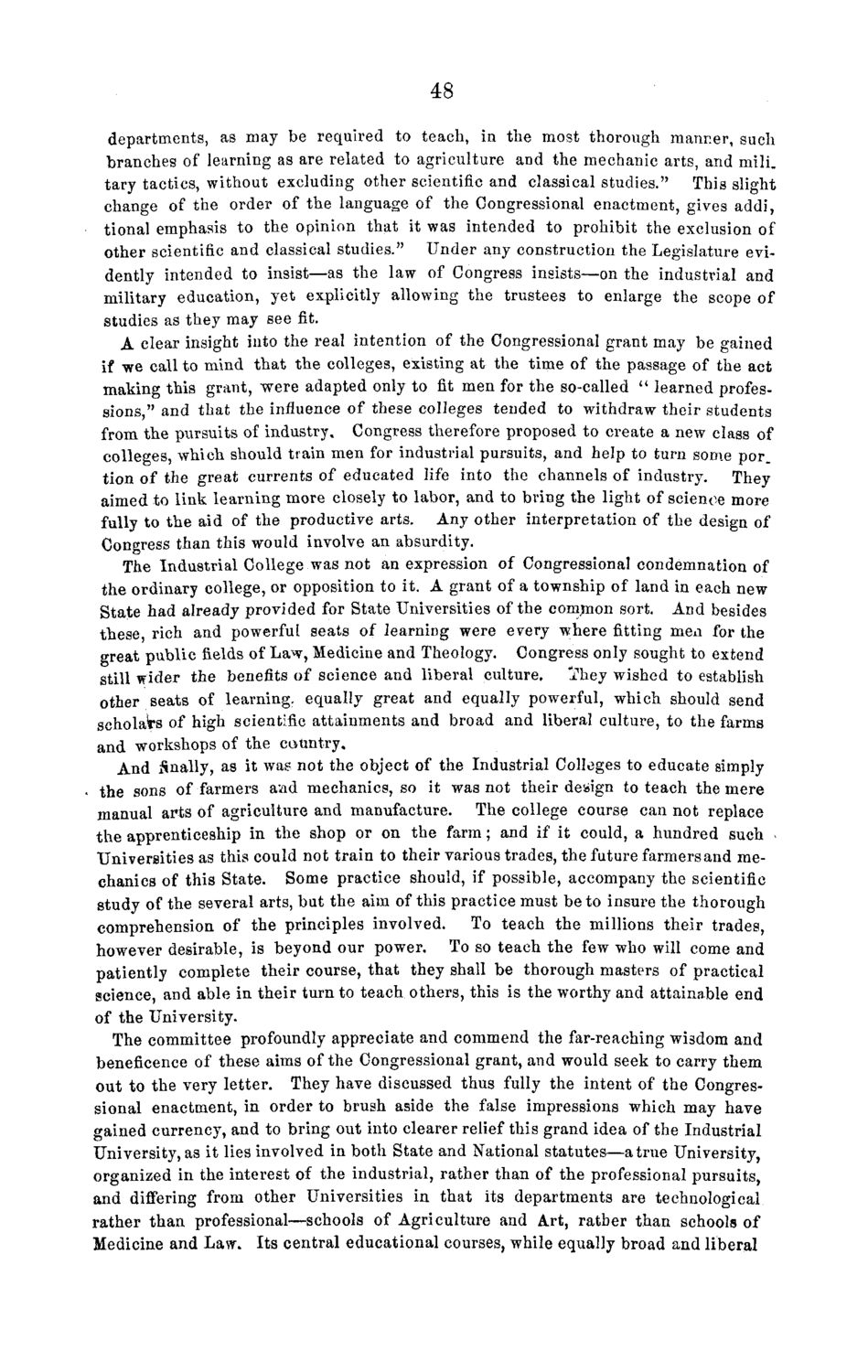| |
| |
Caption: Board of Trustees Minutes - 1868
This is a reduced-resolution page image for fast online browsing.

EXTRACTED TEXT FROM PAGE:
48 departments, as may be required to teach, in the most thorough manner, such branches of learning as are related to agriculture and the mechanic arts, and mili. tary tactics, without excluding other scientific and classical studies." This slight change of the order of the language of the Congressional enactment, gives addi, tional emphasis to the opinion that it was intended to prohibit the exclusion of other scientific and classical studies." Under any construction the Legislature evidently intended to insist—as the law of Congress insists—on the industrial and military education, yet explicitly allowing the trustees to enlarge the scope of studies as they may see fit. A clear insight into the real intention of the Congressional grant may be gained if we call to mind that the colleges, existing at the time of the passage of the act making this grant, were adapted only to fit men for the so-called " learned professions," and that the influence of these colleges tended to withdraw their students from the pursuits of industry. Congress therefore proposed to create a new class of colleges, which should train men for industrial pursuits, and help to turn some por. tion of the great currents of educated life into the channels of industry. They aimed to link learning more closely to labor, and to bring the light of science more fully to the aid of the productive arts. Any other interpretation of the design of Congress than this would involve an absurdity. The Industrial College was not an expression of Congressional condemnation of the ordinary college, or opposition to it. A grant of a township of land in each new State had already provided for State Universities of the common sort. And besides these, rich and powerful seats of learning were every where fitting men for the great public fields of Law, Medicine and Theology. Congress only sought to extend still wider the benefits of science and liberal culture. j?hey wished to establish other seats of learning, equally great and equally powerful, which should send scholars of high scientific attainments and broad and liberal culture, to the farms and workshops of the country. And Anally, as it was not the object of the Industrial Colleges to educate simply the sons of farmers and mechanics, so it was not their design to teach the mere manual arts of agriculture and manufacture. The college course can not replace the apprenticeship in the shop or on the farm; and if it could, a hundred such Universities as this could not train to their various trades, the future farmers and mechanics of this State. Some practice should, if possible, accompany the scientific study of the several arts, but the aim of this practice must be to insure the thorough comprehension of the principles involved. To teach the millions their trades, however desirable, is beyond our power. To so teach the few who will come and patiently complete their course, that they shall be thorough masters of practical science, and able in their turn to teach others, this is the worthy and attainable end of the University. The committee profoundly appreciate and commend the far-reaching wisdom and beneficence of these aims of the Congressional grant, and would seek to carry them out to the very letter. They have discussed thus fully the intent of the Congressional enactment, in order to brush aside the false impressions which may have gained currency, and to bring out into clearer relief this grand idea of the Industrial University, as it lies involved in both State and National statutes—a true University, organized in the interest of the industrial, rather than of the professional pursuits, and differing from other Universities in that its departments are technological rather than professional—schools of Agriculture and Art, rather than schools of Medicine and Law. Its central educational courses, while equally broad and liberal
| |